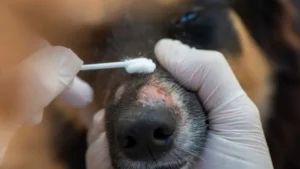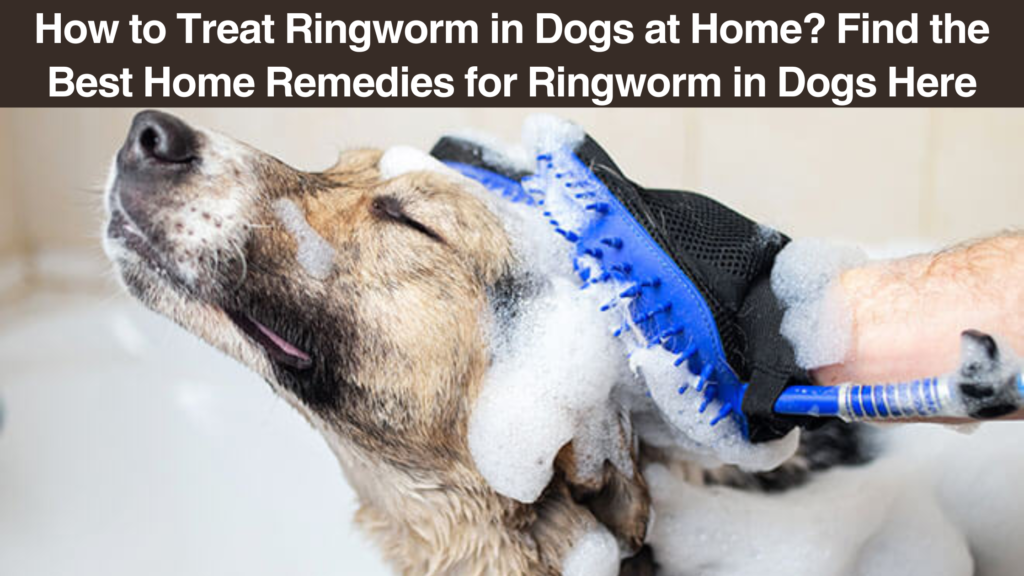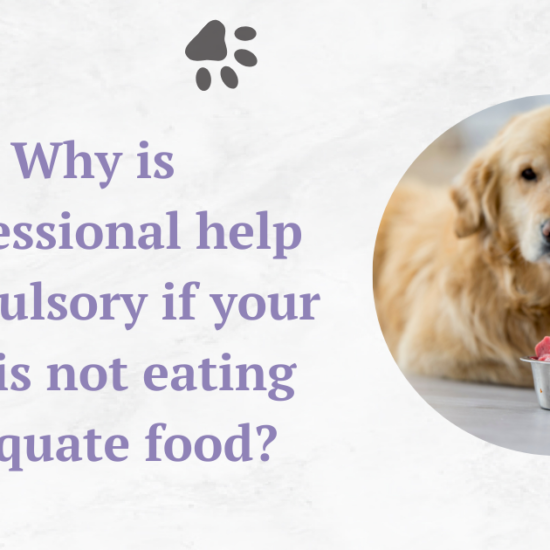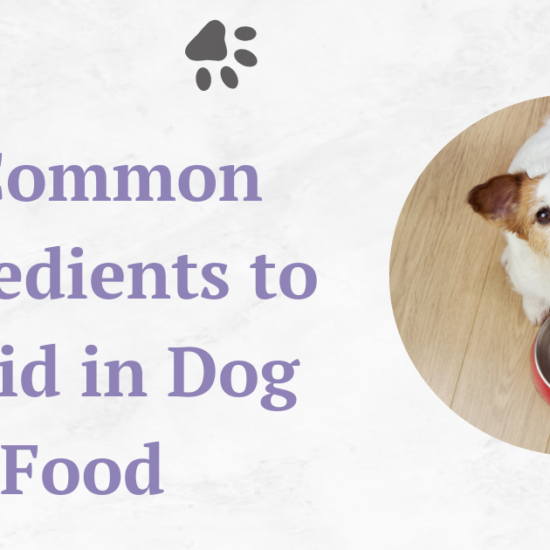Ringworm is a widespread fungal ailment that affects all breeds and ages of dogs. It can result in pain, irritation, and ugly skin sores. While professional veterinarian care is always suggested for correct ringworm diagnosis and treatment, there are some viable home remedies that can supplement veterinary care and help ease symptoms.
Table of Contents
Introduction
We will look at numerous natural cures, ideas, and best tips to treat ringworm in dogs at home in this complete article.
Understanding Dog Ringworm

Let us share some crucial insights to help you with ringworm treatment for dogs at home.
What exactly is ringworm?
Ringworm, also known as dermatophytosis, is a contagious fungal ailment that affects dogs’ skin, hair, and nails. Ringworm, contrary to its name, is caused by numerous different forms of fungi known as dermatophytes. These fungi grow in warm, humid environments, rendering dogs more vulnerable to infection, particularly those with weakened immune systems or pre-existing skin diseases.
How is it communicated?
Ringworm is spread by direct contact with diseased animals or contaminated materials such as bedding, brushes, or even carpets. Because fungus spores can live in the environment for months, it is critical to take precautionary steps to avoid illness spreading.
Recognizing the Symptoms
Ringworm appears in dogs as circular or irregularly shaped patches of hair loss, redness, and scaly skin. Itchy and inflammatory regions may develop with crusty or raised edges. In some circumstances, the hair shafts may break, giving the appearance of stubble. It is important to note that symptoms differ from dog to dog, and some dogs may show no obvious signs of infection while still carrying the fungus.
When should you seek veterinarian care?
If you suspect your dog has ringworm, you should consult a veterinarian right away. A veterinarian will undertake a comprehensive physical examination as well as diagnostic tests such as a fungal culture or microscopic inspection of hair and skin samples. A professional diagnosis is essential for ruling out other skin diseases and determining the best treatment approach for your dog.
The Value of Veterinary Diagnosis

Let us understand the role and benefits of veterinary diagnosis for treating ringworm in dogs.
A Veterinarian’s Role
Veterinarians are critical to correctly detecting and treating ringworm in dogs. They have the knowledge and skills to distinguish between ringworm and other skin disorders with similar symptoms. To establish the existence of ringworm, a veterinarian will do a thorough examination and propose relevant diagnostic testing. They can offer the most effective solutions on how to treat ringworm in dogs at home.
Diagnostic Methods
Veterinarians use a variety of diagnostic techniques to prove that ringworm is present. Wood’s lamp examination, fungal cultures, and microscopic inspection of hair and skin samples are examples of these procedures. Each procedure has advantages and disadvantages, and a combination of tests may be required to get an accurate diagnosis.
The Importance of Professional Diagnosis
While home remedies for ringworm in dogs can provide alleviation, a veterinarian should be consulted for a clear diagnosis. Many skin disorders have identical symptoms, making self-diagnosis difficult. A misdiagnosis might result in poor therapy and unnecessary suffering for your pet. Furthermore, certain medications that are effective for one ailment can aggravate another, underscoring the significance of seeking professional advice.
Ringworm Treatment for Dogs at Home
Home treatments can supplement veterinary treatment and aid dogs with ringworm symptoms. It is vital to note that the medicines to treat ringworm in dogs at home should only be utilized under the supervision of a veterinarian. Here are some of the most popular, effective, and easily available home remedies for ringworm in dogs.

Apple Cider Vinegar
Apple cider vinegar has antifungal qualities and is a natural cure. It can aid in the ringworm treatment for dogs at home and calm the affected regions. Dilute apple cider vinegar with equal parts water and apply it to the afflicted regions using a clean cloth or cotton ball. Dab the solution gently onto the skin, making sure it touches the affected regions. Repeat this procedure several times every day to provide relief and encourage healing.

Coconut Oil
Coconut oil contains antifungal medium-chain fatty acids. It can aid ringworm treatment for dogs at home and calm the skin by reducing the growth of the ringworm fungus. Cold-pressed coconut oil is one of the most sought-after natural ringworm treatments for dogs due to its purity and quality. Massage the coconut oil into the afflicted areas gently to ensure complete coverage. This not only hydrates the skin but also aids in itching relief. For best results, repeat this method two to three times every day.

Aloe Vera
Aloe vera has been used for centuries for its calming and therapeutic effects. As a natural ringworm treatment for dogs, it can alleviate the itching and irritation produced by it. Make certain that you are using pure aloe vera gel with no additives to treat ringworm in dogs at home. Apply fresh aloe vera gel to the affected regions, rubbing it gently into the skin. Allow it to dry before removing it. Aloe vera not only soothes but also stimulates skin regeneration. For optimal results, repeat this practice multiple times per day.

Tea tree oil
Tea tree oil is well-known for its antifungal effects and is often used to treat a variety of skin ailments. Tea tree oil, on the other hand, should be used with caution for ringworm treatment for dogs at home because it can be hazardous if consumed in large quantities. Dilute tea tree oil with a carrier oil such as coconut or olive oil before applying it. Consult your veterinarian for dilution ratios and application instructions. Using a clean cloth or cotton ball, apply the diluted tea tree oil mixture to the afflicted regions. Repeat this procedure as instructed by your veterinarian.

Neem Oil
Derived from the neem tree, neem oil has antifungal and antibacterial effects. It can be used as a natural ringworm treatment for dogs. It is crucial to note, however, that neem oil can be hazardous to dogs if consumed. Dilute neem oil with a carrier oil such as coconut or olive oil before applying it to treat ringworm in dogs at home. Consult your veterinarian for dilution ratios and application instructions. Apply the diluted neem oil mixture to the problematic areas, making sure to cover them completely. Repeat this procedure as instructed by your veterinarian.

Turmeric paste
Turmeric is a natural spice that has antifungal and anti-inflammatory properties. It is one of the most popular home remedies for ringworm in dogs. It can help relieve ringworm symptoms and aid in treating ringworm in dogs at home. To make a turmeric paste, combine turmeric powder with water or coconut oil to make a thick paste. Apply the paste to the affected areas and allow it to sit for 10–15 minutes. Rinse the paste away gently with warm water and massage the area dry. To provide relief and aid in the healing process, repeat this natural ringworm treatment for dogs once or twice a day.

Herbal Baths
Certain herbs have antifungal effects and can be used to soothe the skin and relieve itching in herbal baths. Herbs with relaxing characteristics such as chamomile, calendula, and lavender are widely utilized at home for ringworm treatment for dogs. Make an herbal infusion by steeping plants in hot water and letting them cool. After the infusion has cooled, bathe your dog with it, paying careful attention to the affected regions. Pour the herbal infusion gently over your dog’s body, rubbing it in. This can relieve skin irritation, reduce inflammation, and improve healing.
It is critical to consult your veterinarian before utilizing any home cure to guarantee adequate instruction and that the chosen solution is safe for your dog’s specific ailment. Your veterinarian can provide you with dose instructions, show you how to apply it correctly, and advise you on any potential hazards or contraindications related to home remedies for ringworm in dogs.
Additional Measures to Improve Treatment Efficacy
In addition to home cures, there are other steps you may take during ringworm treatment for dogs at home to improve treatment effectiveness and prevent ringworm spread.
- Sanitization: Thoroughly clean and disinfect your dog’s bedding, toys, grooming tools, and any other items they come into contact with. Use disinfectants or antifungal sprays that your veterinarian has prescribed to treat ringworm in dogs at home. Vacuum the house on a regular basis to remove any stray hair and spores that may be present.
- Maintaining Proper cleanliness: It is critical to practice proper personal cleanliness when handling an infected dog to prevent the spread of ringworm. After contacting the infected regions, thoroughly wash your hands with soap and warm water. Sharing grooming tools between infected and non-infected pets is not recommended. Additionally, when handling an infected dog, wear gloves and protective gear to avoid direct contact with the fungus.
- Isolation and Quarantine: To prevent the spread of ringworm, keep the affected dog separate from other pets in your home. Limit their access to public spaces and provide them with their own bedding, food dishes, and toys. This reduces contact and the potential for transmission to other animals.
- Dietary Considerations: A well-balanced diet is essential for strengthening your dog’s immune system, which aids in infection resistance. Consult your veterinarian for dietary suggestions to ensure your dog is getting the nutrients he needs to maintain his general health and immunological function.
- Immune System Boosting: A healthy immune system is essential to fighting ringworm and preventing its recurrence. Consider immune-boosting vitamins or herbs like probiotics or echinacea along with home remedies for ringworm in dogs. However, before introducing any new vitamins or herbs, ask your veterinarian how to treat ringworm in dogs at home to ensure they are safe and suited for your dog’s individual condition.
Precautions to Prevent Ringworm Spread
Preventing the spread of ringworm and reducing the risk of reinfection are critical. Implement the following precautions:

- Regular Cleaning and Vacuuming: Keep your home clean and sanitary by routinely cleaning and vacuuming, paying special attention to areas where your pets spend the most time. This aids in the removal of spores and avoids their accumulation, lowering the risk of infection.
- Avoiding Contact with Infected Animals: Keep your dog away from other animals that are known or suspected of having ringworm. Visit parks, grooming salons, and other public venues where dogs interact with one another with caution. Allowing your dog to come into direct contact with unknown animals is not recommended, especially if ringworm infection is a possibility.
- Promoting Healthy Skin and Coat: It is critical to maintain your dog’s overall skin and coat health in order to prevent ringworm infections. Brushing and bathing on a regular basis helps eliminate loose hair and dead skin cells that might contain fungi. To keep your skin clean and healthy, use shampoos and conditioners prescribed by your veterinarian.
Note: There might be affiliate links mentioned here. We may receive a commission if you purchase a product through an affiliate link. There is no additional charge for you. Please do your own research before making any online purchases.
When Should You See a Veterinarian?
While home remedies might provide temporary relief and aid in the treatment of ringworm, it is critical to regularly monitor your dog’s condition and seek professional advice as needed.
- Tracking Progress: Keep a close check on the affected areas for signs of improvement or deterioration. Any changes in your dog’s behavior, appetite, or overall health should be noted. If the symptoms do not improve or worsen despite home remedies, it may signal the need for extra veterinary care.
- Recognizing consequences: Ringworm can occasionally result in subsequent bacterial infections or other consequences. Increasing redness, swelling, discharge, or a bad odor coming from the affected areas may be signs of a secondary infection. Furthermore, if your dog exhibits systemic signs such as lethargy, fever, or loss of appetite, it is critical that you seek quick veterinary assistance.
- Seeking Professional Help: If you have any concerns or questions about how to treat ringworm in dogs at home, you should always see your veterinarian. They can offer expert guidance, assess progress, and make changes to the treatment plan as needed.
FAQs
Can I treat my dog’s ringworm with only home remedies?
Home remedies can provide alleviation and aid in the treatment of ringworm, but a veterinarian should be consulted for an accurate diagnosis and treatment plan. Professional advice ensures that the most effective and safe strategy is used for your dog’s individual condition.
Is it okay for dogs to use home treatments like apple cider vinegar and coconut oil?
Apple cider vinegar and coconut oil can be safe for dogs when used appropriately and under veterinary supervision. To avoid any negative reactions, it is critical to use the prescribed dilution ratios and application procedures. Before using any home treatment on your dog, always check with your veterinarian.
How long do home remedies take to work on ringworm in dogs?
The recovery time depends on the severity of the infection and the individual dog’s response to therapy. While some dogs may improve within a few days, the illness can take several weeks to completely clear. When employing home remedies, consistency and patience are essential.
Can I use tea tree oil to treat ringworm on my dog’s skin?
Tea tree oil should be used with caution on dogs because it can be hazardous if consumed or applied in large quantities. It is critical to dilute tea tree oil with a carrier oil and adhere to your veterinarian’s recommendations for dilution ratios and application methods.
Is it necessary to isolate my ringworm-infected dog?
Yes, isolating your dog is critical to preventing ringworm from spreading to other dogs and humans in the household. Separate the diseased dog and provide him with his own bedding, food dishes, and toys. It is critical to limit touch and practice excellent hygiene.
Can I treat my dog’s ringworm with over-the-counter antifungal treatments intended for humans?
It is not advised to use over-the-counter antifungal lotions intended for humans on dogs without veterinary supervision. Some human items may contain hazardous or unpleasant substances for dogs. For appropriate and safe treatment alternatives, it is important to visit your veterinarian.
How can I keep ringworm from spreading to my other dogs in the house?
Maintain good hygiene by washing your hands after touching the sick dog, keeping the environment clean, and avoiding direct contact between infected and non-infected animals to prevent ringworm from spreading to other dogs. Consult your veterinarian for appropriate preventive measures based on the dynamics of your home.
Is it possible to get ringworm from my diseased dog?
Ringworm is a zoonotic infection, which means it can spread between animals and humans. Wear gloves while handling infected dogs, practice excellent personal hygiene, and get medical assistance if you see any suspicious skin lesions or symptoms.
Can I bathe my dog more frequently to aid in ringworm treatment?
While it is crucial to keep your dog’s skin clean, frequent bathing can strip the skin of its natural oils and potentially worsen the disease. Follow your veterinarian’s bathing guidelines and use appropriate shampoos or herbal infusions to soothe the skin.
Are there any food recommendations to help with ringworm treatment in dogs?
Ringworm can be treated with a well-balanced diet that boosts the immune system. Consult your veterinarian for food recommendations that will benefit your general health and immune function. Depending on your dog’s exact needs, nutritional supplements or certain components may be beneficial.
Conclusion
While treating ringworm in dogs at home in conjunction with veterinary care can be helpful, it is critical to consult a veterinarian for an appropriate diagnosis and treatment plan. Although home treatments can help relieve symptoms and improve recovery, it is critical to regularly monitor your dog’s health and seek professional advice when necessary. You can properly treat ringworm and offer your beloved pet the comfort they deserve by following the provided advice and adopting preventive measures. Remember that your dog’s health should always come first, and professional veterinarian treatment should be sought whenever necessary.












